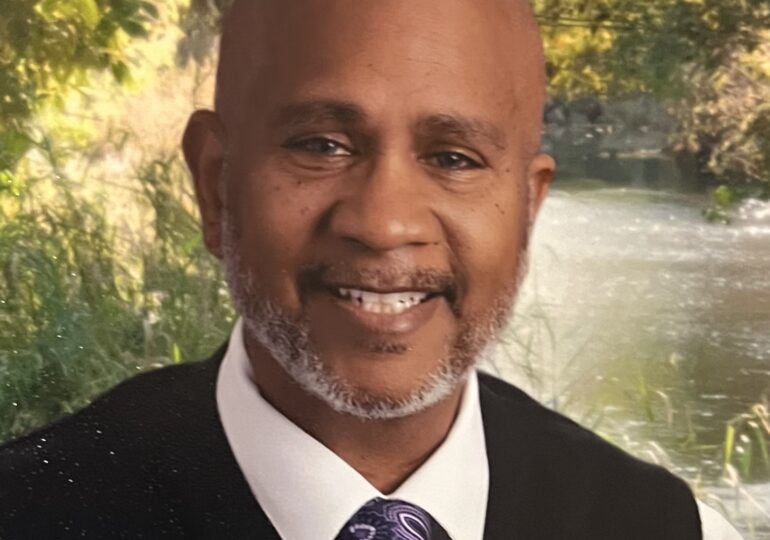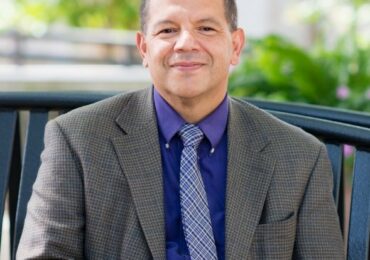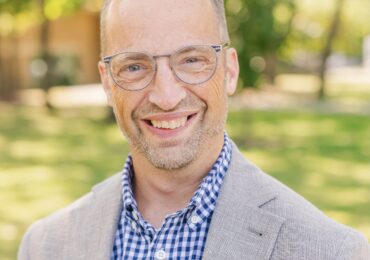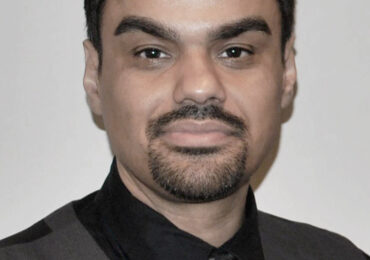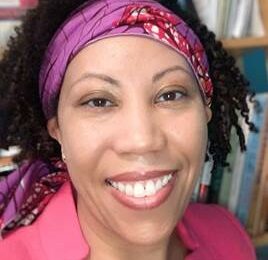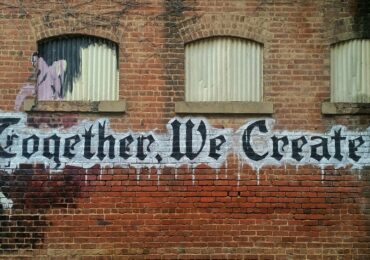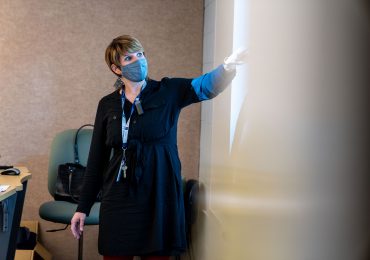On February 15, 2023, Rev. Jackie Jackson led a training session for Trinity faculty and staff on African Biblical History. The workshop is one in a series presented by Mosaic, a Trinity initiative for diversity, equity, and inclusion. Mosaic is led by Dynitta Lieuwen, Special Assistant to the Provost and Chair of Staff Council, and Dr. La Tonia Winston, Director of Learning and Teaching Success and Assistant Professor of Education. The Center for Teaching and the Good Life is privileged to partner with Mosaic for this series. 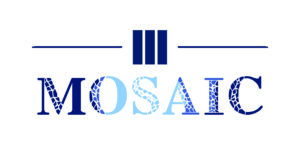 MP. Thank you very much for talking with me today, Jackie. I appreciated your presentation for Trinity staff and faculty and am grateful for the opportunity to talk with you more about your work. To start, could you please tell us a bit about how your background and training have contributed to your work in diversity, equity, and inclusion?
MP. Thank you very much for talking with me today, Jackie. I appreciated your presentation for Trinity staff and faculty and am grateful for the opportunity to talk with you more about your work. To start, could you please tell us a bit about how your background and training have contributed to your work in diversity, equity, and inclusion?
JJ. Well, I’ve always been interested in inner-city ministry, even though I didn’t grow up in the inner-city. When I was a small child, if I saw someone who had a disability or I could tell they were struggling in some way, I would cry. It would make me very sad. And one of the ways I got called into inner-city ministry is that I continued to have that feeling as an adult, and the only thing that made it go away at the level that I was experiencing it was to actively be trying to do something to help someone.
And whenever I stepped away, even for a short time, I started feeling that sadness again. The sadness went away as soon as I got active going into tent cities, homeless shelters, and teaching drug rehabilitation, and I started feeling better. So it’s one of the signs for me that it is it is my calling, and it’s for life for sure.
MP. Thanks so much. Another aspect of the Center for Teaching and the Good Life is that we engage staff and faculty around themes of vocation. Trinity is very particular about saying that your vocation, what God has called you to do, is not just your job. One of Trinity’s goals for all students, stated in our Foundations Learning Outcomes, is that they “develop vocations that include and extend beyond career or work.” Could you please tell us about a particular time in your life when you felt called by God into a new aspect of your vocation or a new way of thinking about your vocation?
JJ. As I said, I’ve always done inner-city ministry. I’ve done street ministry. I’ve worked in prisons with boys who were being tried as adults. And my doctoral work has been in this area, as well. I started seeing a drifting away from the church as people called Christianity the “white man’s religion.” And I had already for years been studying Black biblical history, things of that nature, but it was kind of a side focus for me. You know, every once in a while I might teach about it. I have a radio show, so I did a short series on the radio about it, but it only became a crusade in the last five years.
Once I started seeing what was happening and why it was happening with young folks, then I felt like everything God had been showing me, that I was just curious about, was kind of coming to bear where I needed it to be a major part of God’s ministry through me. One of the reasons I know about a variety of religions is that when you’re witnessing to people, different things will come up. And you’ve got to have an answer. Well, this is kind of the same thing. This has come up, but I didn’t realize that God was really preparing me for the next phase of my life to go and get these young African American men and women that, as they turn 18, you know, to get them turned around so they can see that God has included all of us in Scripture. And so far, so good.
MP. Thanks so much. That leads really well right into my next question, which is, how do you see your work in diversity, equity, and inclusion as joined with God’s work in the world?
JJ. I truly believe that the things that I’ve learned where God has included everybody, I believe it’s going to reshape the world now. That might be a big, lofty dream, but that’s just how I see it, that God is going to reshape the world so that there’s harmony. Harmony is a word that I use constantly that. God never intended for us to be separate. Jesus even said people are going to come to me and have a relationship with me when they see the love you have for one another. And so it’s a big deal for me to make sure that, on one side or the other, nobody sees themselves as better than the other, bigger than the other, God loves them more, or any of those kind of things, but that we all walk in harmony. Because that’s what’s going to draw people of all kinds to Christ. So I’d see that as what I’m going to be doing for the rest of my life, doing everything I can and making that part happen.
MP. The Center for Teaching and the Good Life considers teaching as everything all staff and faculty do in relation to students, not just what takes place in their courses. What would you like faculty and staff to take away from your presentation and apply to their work with students?
JJ. As a professor, as well as having taught primary grades, that relationship is just so crucial. There are students who I saw their lives get turned around because they trusted me and they knew that I cared. So that relationship that we were able to build made all the difference. When they were dealing with a tougher subject, they would come to me, and I believe in what I was hoping that I was able to share within the presentation. It’s not a matter of giving a student a break, grading differently, or anything like that, but making sure that everybody knows they have value.
And if you see a person coming into Trinity and they have some self-esteem issues or something like that, be that encourager to notice that, to have an understanding of perhaps the demographic that they’re coming from or whatever the situation may be. In the schools where I’ve taught, I’ve worked with students from a variety of socioeconomic levels. Sometimes a student has a lot of money, but they’ve got issues because of some things that have happened in their family. By being aware of what’s going on, you can build that relationship by being involved in that person’s life.
You’ll have students who come to Trinity and they’re still thinking Christianity is a white man’s religion, so they’re wrestling. But to understand enough of Black biblical history so you can share with them the things that will make them comfortable in that environment and understand it’s all about love and harmony. Nobody’s trying to be better than anybody else. You are included and just as important as anyone else in the room.
MP. I appreciate that perspective. Thank you. Finally, from the perspective of your work and particularly your presentation at Trinity, how would you answer the question, how can our vision of vocation and the good life include all human persons?
JJ. I think that it has to be on purpose, that Trinity begins to seek out making the campus look like heaven’s gonna look, having all of that variety. And I saw some of that with the staff. I don’t know all of what Trinity is doing currently, but it has to be on purpose. And it has to be that when students come, that staff and faculty are prepared. We have a new demographic that’s coming in or more of a demographic that’s coming in than we’ve had before, for example. We need to be ready to show kindness, to show love.
We’re on the front line here. We’re the first Christians that some of them may see and get to know. And with that in mind, we want to make sure that we represent Jesus well. And so I think from top to bottom, it needs to be very clear that we’re on a mission here, and there are no big shots and little shots in this. All of us are servants of God to draw people in, to show them what Christ looks like, because we may be the only Christ they’ve ever really seen or understood. We have to make sure that’s showing forth so that everybody feels welcome.
I’m so impressed with your president. I’m so blessed I had a chance to meet with him, to pray with him. I think that Trinity just needs to keep going. Implement those things, because I think the heart of God requires a drive to be more diverse and inclusive. I’m praying for Trinity every day, that this will come to pass. That’s what we need.
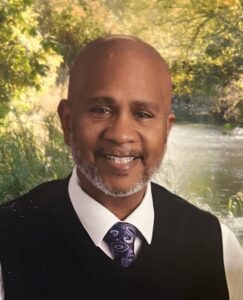
Pastor Jackie Jackson is from Cincinnati, Ohio. He’s the father of four great kids who are grown. His best friend is his praying wife, Yvette. God has had him serve in various areas of the five-fold ministry (Ephesians 4:11). His ministry began in California preferring street and hospital ministry to the pulpit. Upon his return to Cincinnati, Pastor Jackie became the president of an urban outreach ministry called Operation Nehemiah. He also spent 4.5 years working in Cincinnati’s Justice Center (jail) with 14-17-year-old boys who were being tried as adults. Through the 1990s and into the new millennium, Pastor Jackie answered the Lord’s 13-year call to be the senior pastor of his inner-city church plant, Living Testimony Church International. He also became the Director of Evangelism & Outreach at City Gospel Mission (8.5 yrs.), which involved training churches and teams for urban evangelism. In addition, during this period Pastor Jackie served for 10 years as a Cincinnati Police Chaplain. Pastor Jackie has had the privilege of serving as a missionary to both Kenya and the Oglala Sioux in South Dakota. Currently, Pastor Jackie is working on his doctoral dissertation (Black Biblical History), hosting a radio show (10 yrs.), training pastors, doing outreach consulting, teaching k-12, being a university professor, hosting a live streaming show Urban Apologetics Channel, and preaching wherever Jesus opens the door.


